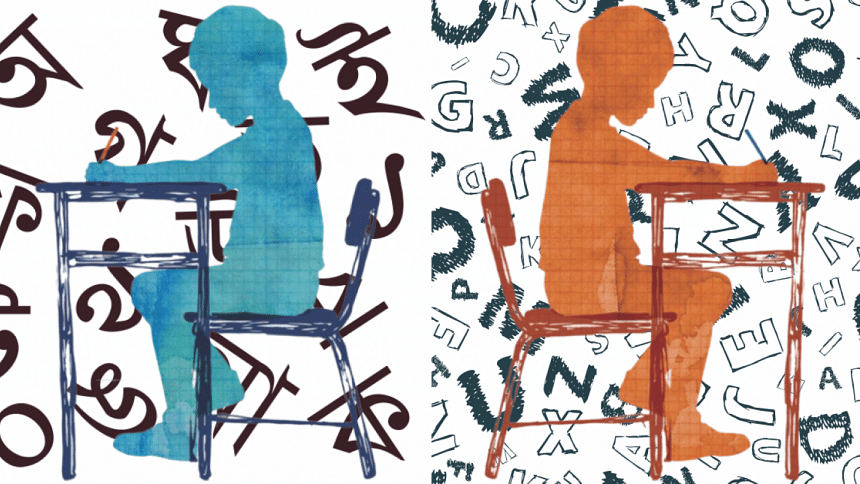Bangla: What is it good for?

Very rarely have I seen an English-medium student liking the subject Bangla in school. In fact, one of the most popular questions that I have faced is: "Sir, why do we have to learn Bangla?"
Students cannot be faulted for asking this seemingly unpatriotic question. After all, English-medium students grow up in an environment where there is a "no Bangla on campus" policy, unless you are in the Bangla class—a policy that is enforced quite seriously, and with grave consequences for flouting it.
Additionally, Bangla is a much tougher language to learn compared to English. The famous Wren & Martin English grammar book weighs nothing next to the typical Bangla grammar book, with its plethora of rules to understand and memorise.
The icing on the cake is the colonial history of English and its impact on Bangla. To put it simply, as far as the world of an English-medium student is concerned, English is cool and useful. Bangla is neither. If you see both the languages from the eyes of a student growing up within an English-medium curriculum, there is no utility of Bangla; not in school ("no Bangla" policy), not for reading (almost all online content is in English), not for writing, not in entertainment (Netflix, and other online streaming sites), not for communication, not for video games, and not for most daily life situations.
And telling these students that they "should learn Bangla for patriotic reasons since we are the only country which fought for its mother language" does not help when all the above situations sideline the need for patriotism in terms of learning Bangla.
So, English-medium students do not have any emotional or logical motivations for learning Bangla. This is even truer if they are planning to go abroad, which is what happens in many cases.
But they are too young to know that, should they end up staying in Bangladesh for whatever patriotic or unpatriotic reason, they will definitely need Bangla to survive in Bangladesh.
Whether it's getting vehicle documents from BRTA or filing tax papers with the income tax offices, you definitely need to be fluent in Bangla to both fill out the forms and deal with the government officials manning the posts at these offices. Try speaking in English or try being too "cool" with the English-medium swagger, and one of two things will happen: Either you will be taken for a ride by someone (the hidden network of dalals) or you will get stuck in a loop (chokkor kata).
As a matter of fact, exposing your English-medium swagger could be dangerous in a lot of places and contexts. Consider a place like Karwan Bazar, where not only do you have to be fluent in Bangla, but you also have to adopt the local dialect to win a haggling match. Or a place like the land office, where you have to understand the body language and other nuances of the officers to make sure that your property documents are vetted properly.
There are simply too many situations in Bangladesh —dealing with immigration officers at the airport, dealing with traffic sergeants on the roads, buying groceries from kitchen markets, interacting with government officials or building people, etc.—where one would benefit from Bangla fluency.
Sadly, most English-medium students are not exposed to these situations during their school lives, which results in them seeing their country from behind invisible blinders. They mostly live within four walls: home, school, restaurants. This applies to the majority of English-medium school students at present.
My humble request to all the stakeholders—parents, teachers and school authorities—who are holding up the four walls would be to break them down. We are not doing any favours to our future generation by keeping them away from the real-life side of Bangladesh.
Exposing English-medium children to these situations will open their eyes to the need of being fluent in Bangla. I truly believe that if students are made aware about the context/purpose/usage of Bangla, or at least its usage in their own future lives, the language will gain significance in their eyes.
Though it is only a theoretical experiment so far, I have been trying it on my own children and students, and I am seeing results. Opening their eyes to these situations is not only helping me to make them understand what Bangla is good for, but their interest in the situations themselves is proving to be promising in the case of other subjects as well.
But that's another article altogether.
Asifur Rahman Khan is an educator, the science coordinator at Crescendo Educational Institution and an adjunct faculty at the University of Liberal Arts Bangladesh (ULAB).

 For all latest news, follow The Daily Star's Google News channel.
For all latest news, follow The Daily Star's Google News channel. 



Comments